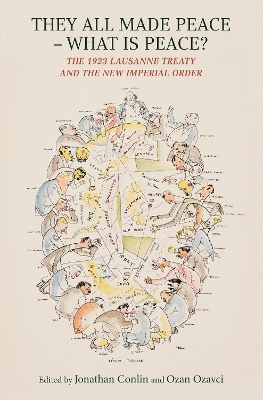
They All Made Peace - What's Peace?
Gingko Library (Verlag)
978-1-914983-05-4 (ISBN)
The 1923 Treaty of Lausanne may have been the last of the post-World War One peace settlements, but it was very different from Versailles. Like its German and Austro-Hungarian allies, the defeated Ottoman Empire had initially been presented with a dictated peace in 1920. In just two years, however, the Kemalist insurgency turned defeat into victory, enabling Turkey to claim its place as the first sovereign state in the Middle East. Meanwhile those communities who had lived side-by-side with Turks inside the Ottoman Empire struggled to assert their own sovereignty, jostled between the Soviet Union and the resurgence of empire in the guise of League of Nations mandates. For 1.5m Ottoman Greeks and Balkan Muslims, ‘making peace’ involved forced
population exchanges, a peace-making tool now understood as ethnic cleansing. Chapters consider competing visions for a postOttoman world, situate the population exchanges relative to other peace-making efforts, and discuss economic factors behind the reallocation of Ottoman debt as well as refugee flows and oil politics. Further chapters consider Arab, Armenian, American and Iranian perspectives, as well as the long shadow cast by Lausanne over contemporary politics, both inside Turkey and out.
Jonathan Conlin is a senior lecturer at the University of Southampton and cofounder of the Lausanne Project, a forum for scholarship on interwar relations between the Middle East and the wider world. His books include Mr. Five Per Cent and Tales of Two Cities. Ozan Ozavci is assistant professor of transimperial history at Utrecht University and, with Jonathan Conlin, cofounder of the Lausanne Project. He is the author of Dangerous Gifts and Intellectual Origins of the Republic. Contributors: Aimee Genell is Assistant Professor of Middle Eastern History, University of West Georgia, Erik Goldstein is Professor of International Relations and Professor of History, Boston University; Samuel Hirst is Assistant Professor of International Relations, Bilkent University; Etienne Peyrat is Assistant Professor of History, Sciences Po Lille & University of Lille; Cemil Aydin is Professor of History at University of North Carolina at Chapel Hill; Lerna Ekmekcioglu is McMillan-Stewart Associate Professor of History, MIT; Leila Koochakzadeh is Lecturer at the Institut Nationale des Langues et Civilisations Orientales (INaLCO), Paris; Elizabeth F. Thompson is Professor of History and Mohamed S. Farsi Chair of Islamic Peace at the American University in Washington, DC; Andrew Patrick is Associate Professor of History, Tennessee State University; Sarah Shields is Professor and Director of Graduate Studies, Department of History, University of North Carolina; Mustafa Aksakal is Nesuhi Erteguen Chair of Modern Turkish Studies & Associate Professor of History, Georgetown University; Patrick Schilling is a PhD candidate in history at Georgetown University; Leonard V. Smith is Frederick B. Artz Professor of History, Oberlin College, Oberlin, Ohio (USA); Laura Robson is Oliver-McCourtney Professor of History, Penn State University; Haakon Ikonomou is Associate Professor at the Saxo Institute, University of Copenhagen; Dimitris Kamouzis is Researcher at the Centre for Asia Minor Studies in Athens, Greece; Hans-Lukas Kieser is Associate Professor of History at the Centre for the Study of Violence, University of Newcastle, Australia; Goekhan Cetinsaya retired from the Istanbul Sehir University; Julia Secklehner is a Research Fellow for the CRAACE Project at the Department of Art History, Masaryk University (Brno, Czechia).
Contents
Part 1: From One Imperial Order to Another
Minority Rights and International Law at Lausanne – Aimee Genell
Britain’s Plans for a New Eastern Mediterranean Empire, 1916-1923 – Erik Goldstein
On the Margins of the Lausanne Conference: The Soviet Union and the Exclusions of the post-World War I International Order – Samuel Hirst & Etienne Peyrat
The Lausanne Treaty in the Contested Narratives of World Politics– Cemil Aydın
Part 2: Absent Presences
Debates over an Armenian National Home at the Lausanne Conference and the Limits of Post-Genocide Co-Existence – Lerna Ekmekçioglu
Iranian Attempts to Participate in the Lausanne Conference – Leila Koochakzadeh
Arab Exclusion at Lausanne: A Critical Historical Juncture – Elizabeth F. Thompson
Part 3: Making Concessions
Oil over Armenians: The 1920s ‘Lausanne Shift’ in US Relations with the Middle East– Andrew Patrick
The Mosul Question: Lausanne and After – Sarah Shields
Turkey and the Division of the Ottoman Debt at Lausanne – Patrick Schilling & Mustafa Aksakal
Part 4: Moving the People
International Law and the Greek-Bulgarian and Greek-Turkish Population Exchanges– Leonard V. Smith
A Capitalist Peace? Money, Labor, and Refugee Resettlement – Laura Robson
At the Crossroads of History:Thanassis Aghnides, Ayrilios Spatharis and the Greek-Turkish Population Exchange – Haakon Ikonomou & Dimitris Kamouzis
Part 5: Framing Lausanne
Framing Pasts and Futures at the Lausanne Near East Peace Conference – Hans-Lukas Kieser
Lausanne in Turkish Official and Popular Historiography: A ‘War of Identities’ in Turkey – Gökhan Çetinsaya
Diplomacy, Entertainment, Souvenir? Guignol à Lausanne (1922) and the Lausanne Conference in Caricature – Julia Secklehner
| Erscheinungsdatum | 11.07.2023 |
|---|---|
| Co-Autor | Aimee Genell, Erik Goldstein, Samuel Hirst |
| Zusatzinfo | 20 colour illustrations and maps |
| Sprache | englisch |
| Maße | 156 x 234 mm |
| Themenwelt | Geschichte ► Allgemeine Geschichte ► Neuzeit (bis 1918) |
| Geschichte ► Allgemeine Geschichte ► 1918 bis 1945 | |
| Geisteswissenschaften ► Geschichte ► Regional- / Ländergeschichte | |
| ISBN-10 | 1-914983-05-X / 191498305X |
| ISBN-13 | 978-1-914983-05-4 / 9781914983054 |
| Zustand | Neuware |
| Haben Sie eine Frage zum Produkt? |
aus dem Bereich


